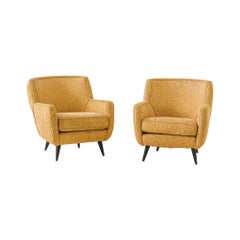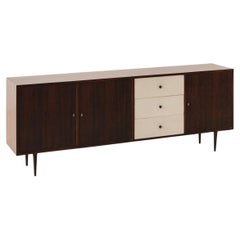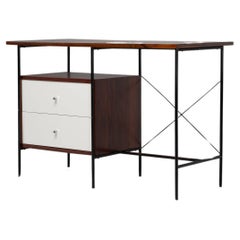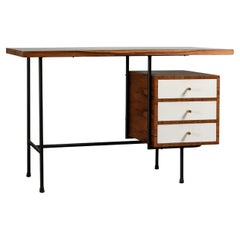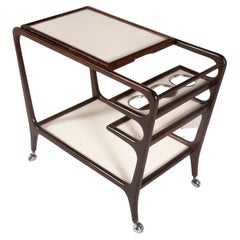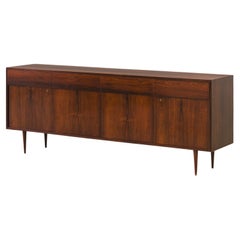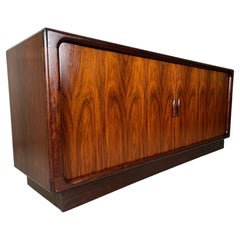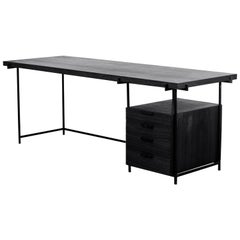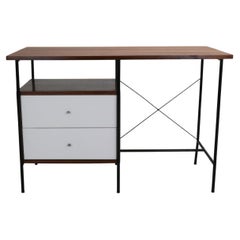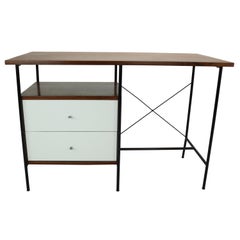Unilabor Furniture
Although best known for his photography, Geraldo de Barros was an important contributor to the canon of mid-century modern furniture design and was one of Brazil’s most influential multidisciplinary artists. He was a cofounder of the furniture company Unilabor in 1954.
Born in 1923 in Chavantes, São Paulo, de Barros began his artistic career as a painter before discovering a passion for photography in the 1940s.
In the early 1950s, de Barros traveled throughout Europe, including Switzerland, where he met Bauhaus graduate Max Bill. At the time, Bill was collaborating with the Scholl Foundation on developing a design institute in Ulm, Germany, that combined Bauhaus tradition with emerging technical elements in design practice. Bill invited de Barros to visit the institute, where he became influenced by Bill’s philosophy of Gute Form — the belief that carefully designed objects could bring artistic values into homes.
Upon his return to São Paulo, de Barros delved into furniture design. Along with engineer Justino Cardoso, metalworker Antônio Thereza, and a Dominican priest, Friar João Batista Pereira dos Santos, he founded the furniture company and Christian cooperative Unilabor on the outskirts of São Paulo in the mid-1950s.
As the chief designer at Unilabor, de Barros incorporated the concept of Concrete art into many of his pieces, particularly his armchairs. His dining room chairs, bookcases, coffee tables and desks were also designed with straight lines, sobriety and functionality in mind and made with natural materials such as rosewood, jacaranda and iron, while the doors of Unilabor cabinets and tables saw an integration of Formica.
Hallmarks of Brazilian mid-century design include the use of these native materials as well as smooth, sculptural forms, and the popularity of the region’s modernist furniture of the 1940s and ’50s has made household names of de Barros and designers such as Oscar Niemeyer, Sergio Rodrigues and José Zanine Caldas.
Given that it was more of a cooperative with a social mission than it was a manufacturer, Unilabor paid well and offered innovative modular furniture by way of de Barros-designed components that were produced serially to be used in the construction of complete furnishings.
Despite Unilabor’s success, the company ran into economic difficulties and eventually closed. Undaunted, de Barros founded another furniture company in 1964 — Hobjeto Indústria e Comércio de Móveis — where he focused on progressive furniture design with more geometric shapes.
During the 1960s, de Barros continued with furniture design and, as a painter, became interested in Pop art and abstract movements, founding influential groups such as Grupo 15, Galeria Rex and Grupo Ruptura.
On 1stDibs, discover a range of vintage Unilabor furniture.
1950s Brazilian Mid-Century Modern Vintage Unilabor Furniture
Wood, Fabric
1950s Brazilian Mid-Century Modern Vintage Unilabor Furniture
Brass
1950s Brazilian Mid-Century Modern Vintage Unilabor Furniture
Metal
Mid-20th Century Brazilian Mid-Century Modern Unilabor Furniture
Metal, Steel
1950s Brazilian Mid-Century Modern Vintage Unilabor Furniture
Metal
1950s Brazilian Mid-Century Modern Vintage Unilabor Furniture
Rosewood
1950s Brazilian Modern Vintage Unilabor Furniture
Iron
1950s Brazilian Mid-Century Modern Vintage Unilabor Furniture
Brass, Iron
1950s Brazilian Mid-Century Modern Vintage Unilabor Furniture
Iron
1950s Brazilian Mid-Century Modern Vintage Unilabor Furniture
Cane, Rosewood
1950s Brazilian Mid-Century Modern Vintage Unilabor Furniture
Iron
1950s Brazilian Mid-Century Modern Vintage Unilabor Furniture
Formica, Hardwood
20th Century Danish Scandinavian Modern Unilabor Furniture
Mahogany, Oak, Rosewood
2010s Brazilian Mid-Century Modern Unilabor Furniture
Steel
Mid-20th Century American Mid-Century Modern Unilabor Furniture
Walnut
1950s Italian Mid-Century Modern Vintage Unilabor Furniture
Glass, Beech
1960s Danish Mid-Century Modern Vintage Unilabor Furniture
Rosewood
1960s Danish Mid-Century Modern Vintage Unilabor Furniture
Rosewood
1960s Danish Mid-Century Modern Vintage Unilabor Furniture
Rosewood
Mid-20th Century Italian Mid-Century Modern Unilabor Furniture
Glass, Wood
Mid-20th Century Brazilian Mid-Century Modern Unilabor Furniture
Fur, Faux Fur, Hardwood
20th Century British Mid-Century Modern Unilabor Furniture
Teak
1950s Danish Mid-Century Modern Vintage Unilabor Furniture
Rosewood
2010s Brazilian Mid-Century Modern Unilabor Furniture
Copper
1950s Brazilian Mid-Century Modern Vintage Unilabor Furniture
Metal, Brass
1950s Brazilian Mid-Century Modern Vintage Unilabor Furniture
Metal, Brass
Mid-20th Century Brazilian Mid-Century Modern Unilabor Furniture
Iron
Mid-20th Century Brazilian Mid-Century Modern Unilabor Furniture
Mid-20th Century Brazilian Mid-Century Modern Unilabor Furniture
Brass, Iron
1950s Brazilian Modern Vintage Unilabor Furniture
Brass
1950s Brazilian Modern Vintage Unilabor Furniture
Brass
1960s Brazilian Mid-Century Modern Vintage Unilabor Furniture
Iron
